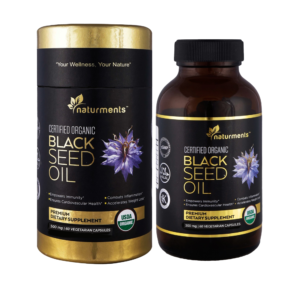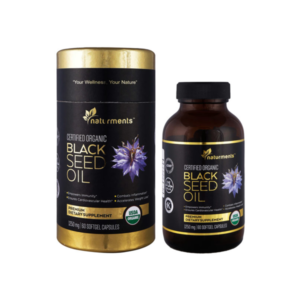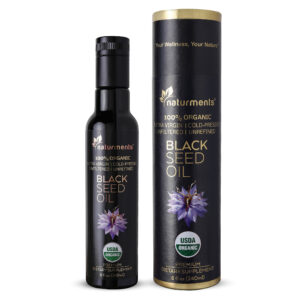The numerous health benefits of the organic black seed oil are very apparent.
If you look at the history of the black seed, you will find its reference even in the ancient religious and medical texts.
Moreover, the Bible terms it as the curative black cumin while Hippocrates and Dioscorides call it Melanthion.
Derived from the flowering plant, Nigella Sativa, the seeds also have a long history of use in various culinary traditions.
In recent times, many studies have been conducted to find out the benefits of black seed oil on respiratory health.
Asthma is the most common chronic disease causing more than 80% of asthma-related deaths as per the WHO.
So, it is good to know how black seed oil can benefit patients suffering from respiratory ailments.
Let’s dig deeper into it based on research findings.
However, first, let’s look at this question.
What makes black seed oil so efficient?

Researchers attribute the efficacy of the Nigella Sativa oil to its Quinone constituents.
The oil contains thymoquinone (TQ), an important bioactive constituent that makes up 30 to 48% of the total compounds. There are other functional components such as p-cymene, carvacrol, and thymohydroquinone.
Moreover, it also contains fixed oil ranging from 28 to 36%. It is mainly composed of unsaturated fatty acids including arachidonic, eicosadienoic, linoleic, and linolenic, and saturated fatty acids.
Phytotherapy research: Nigella sativa supplementation improves asthma control and biomarkers
In a study conducted by scientists from University College London and the King Abdulaziz University of Saudi Arabia to find out the efficacy of black seed oil, 80 asthmatics were enrolled.
The primary outcome of the study was to assess the Asthma Control Test score and the secondary outcome was to test pulmonary function.
40 patients got treated with Nigella Sativa Oil capsules 500 mg twice daily for 4 weeks while the other group received a placebo.
After 4 weeks, ten patients pulled out from each group. The group that received Nigella Sativa Oil treatment showed a substantial improvement in the mean Asthma Control Test score compared with the placebo.
The study concluded that black seed oil supplementation improves asthma control with a tendency in improving pulmonary function.
Study to test the effectiveness of black seed oil in treating allergic rhinitis
There’s one study conducted to study the effects of N. Sativa seed oil against allergic rhinitis.
In the study, the researchers gave 68 patients, aged 6–45 years, with different severities (mild, moderate, and severe), 2 drops of black seed oil nasally (one in each nostril) 3 times daily for 6 weeks.
Turns out that 100% of the participants in the mild severity group, 68.7% in the moderate severity group, and 58.3% in the severe group showed no symptoms of allergic rhinitis after 6 weeks.
Clinical efficacy of black seed on subjective feeling in patients with allergic diseases
To find out the efficacy of black seed in allergic diseases, four clinical studies were conducted wherein 152 patients with allergic diseases (allergic rhinitis, bronchial asthma, atopic eczema) were treated with black seed oil.
Black seed oil was given to the patients in capsules at a dose of 40 to 80 mg/kg per day. The score of subjective feeling reduced during the treatment in all four studies.
There was a slight decrease in plasma triglycerides and discrete and an increase in HDL cholesterol. To conclude the study, the black seed oil is an effective adjuvant for treating allergic diseases.
Effect of black seed aqueous on respiratory symptoms and pulmonary function tests on chemical war victims
In a randomized, placebo-controlled study of patients injured by chemical weapons, it was found that treating the patients with boiled water extracts of black seed improved respiratory symptoms, chest wheezing, and pulmonary function. Moreover, it also cut down reliability on drug treatment.
Human study to test the antiasthmatic properties of black seed
Mashhad University of Medical Sciences, Iran enrolled 15 asthmatic patients to study the bronchodilatory effects of 50 and 100mg/kg of the boiled extract of black seed in comparison with 6mg/kg theophylline.
Moreover, black seed also shows a comparatively strong antiasthmatic effect on asthmatic airways of the patients.
Black seed is beneficial for respiratory health

As you can see from the numerous findings, the black seed oil is effective in improving respiratory health.
It can significantly reduce asthma symptoms and allergic reactions. One can even attribute its benefits to its antihistamine and anti-inflammatory properties.
The intake of black seed oil can reduce the swelling in the airways and stop the coughing, runny nose, sneezing, and chest tightness triggered by allergies. It will help you relax. It is also advisable to take black seed oil if you have a cold.
Moreover, since the miracle cure contains antioxidants and antimicrobial properties, it will prevent you from getting sick by boosting your immune system. It can help your body to fight against any unfriendly bacteria or viruses threatening your health.
Several studies have seen the positive effects of Thymoquinone in cardiovascular disorders, reproductive disorders, diabetes, and respiratory ailments. And the best part is Thymoquinone has very low negative effects and no severe toxicity.
How to take black seed oil?
- You can take black seed oil by adding it with honey.
- Health experts and natural physicians also advise taking 1 teaspoon of black seed oil two times daily for therapeutic effects. Take it before meals and bedtime.
- You can take black seed oil with turmeric.
- You can also follow the instructions given on the product labels or speak to your healthcare provider.
Wrapping Up
Are you suffering from asthma, allergy, or any other respiratory ailment? Consider including organic black seed oil supplement in your daily diet.
This superfood has cured or relieved respiratory symptoms in many patients. And it could positively improve your symptoms too.
Furthermore, it has negligible to no side-effects so instead of taking your countertop medicine. So, why not try black seed oil to maintain your health?
It is not advisable to replace your prescription with black seed oil but there is no harm in supplementing your body with it.
Moreover, for maximum black seed oil benefits – make sure you are going for cold-pressed 100% organic black seed oil so as to supply your body with the best quality supplement.
References in this article:
-
Therapeutic potential of black cumin seeds and beyond (Source).
- WHO Research (Source).
-
The Role of Nigella sativa and Its Active Constituents in Learning and Memory (Source).
-
Chemical Composition And Antioxidant Activities Of Black Seed Oil (Source).
-
Nigella sativa Supplementation Improves Asthma Control and Biomarkers (Source).










